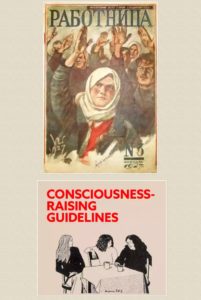(*) The title is barrowed from the book of Todd McGowan, “Enjoying what we don’t have – The political project of psychoanalysis“, University of Nebraska Press, 2013.

(Sendika.org’da Türkçe’sini okumak için tıkla)
How does the symbolization of a lack turns into fun? To understand this mechanism, I will proceed under the guidance of the articles of Professor Slavoj Zizek’s “Ego Ideal and the Superego, Lacan as a Viewer of Casablanca” and Owen Hewitson’s “What Does Lacan Say About … Jouissance?”
The ideal ego is the way the subject (small other) desires to be perceived by Other, thus, it is ‘imaginary’. Ego Ideal, by contrast, is the subject’s self-positionning into societal rules, thus, it’s “symbolic”. The superego is distinguished from Ego Ideal as its back-face, evil twin: it judges, “stigmatizes” the subject by its inadequacy to conform law. It mocks, have fun with it. Here reveals the paradoxical formula that connects ‘jouissance’ to ‘obscene’: The more Subject tends to comply, the more it becomes subject to get judged and stigmatized – and this duality of opposite agencies (Ego Ideal versus the superego) become eventually trapped into a swirl of self-perpetuating ‘obscene jouissance’.
Let’s start with the video of my dear friend and colleague Ramazan Yaylalı, a Vienna sociologist, the video he sent to me on Twitter (hold tight, very disturbing):
Sociologist Ramazan Yaylalı drew my attention to the comments under the video. Reading these reactions together with the video, he stressed the need to understand the ‘pathology’ – not just in the video – but in the integrity of the actors-commentator re-act-ions.

Almost all of the reactions to the video cumulate on the words like ‘perversion’, ‘rape’, ‘turpitude’, ‘immorality’, ‘filth’, ‘racism’, ‘abuse’, ‘plunder’, ‘abomination’, ‘indecency’ and so on.
Our basic philosophy rule dictates us to hold on and step back to think about a social phenomenon when everyone gives the same reaction. Because such are the moments when the distinction between ‘society’ and ‘mass’ is lost. This video on the Twitter page too, points to such a primordial failure.
Let’s first cut the chorus short:
– What do you claim to be ‘rape’ here? The ones on the bottom and the ones on the top are both gathered there with their own consent and they all seem to have fun.
– Everyone in the hall is seen to be men. If you see the event as a “gay” practice and therefore define it as outragenous, are you homophobic?
– There is a chief with a stick in his hand who shoves the ones who exercise on the floor. There is also another man who acts as an adjutant of the chief who pokes the exercisers with his foot. It looks like he’s helping the chief. If this act is a disciplined compulsive play in a sado-masochistic practice, are you against SM sexual orientations?
– A flag hanging on the wall… Based on this ‘sign’, many of commentators linked this ‘disgust’ to being a nationalist and/or pro-government. A smaller part of commentators, however, say that the Turkish flag does not suit this scene. So the question comes to mind: shall we just approve the non-nationalists’s homosexual (or different sexual) orientations? What is the formula of this relationship you (the commentators) establish between the political identity and sexual orientation? According to which criteria this link is approved or not approved?
In this article, we will show that this phenomenon has nothing to do with nationality or being nationalist or non-nationalist. It is a universal phenomenon unique to mankind.
Now, to understand what is really happening, let’s ask questions that are more formal than polemics:
Does the practice in the video really have something to do with sexual pleasure?
It is not possible to say that the men are really sexually driven during this fun. If one was driven indeed, he would have been ashamed. The joke would have turned to poop (the Turkish idiom “şakanın kaka olması” equates ‘jouir’ with poop – very Lacanian in defining the obscene aspect of jouissance).
So we arrive at this conclusion: there is no pleasure in this scene. But there is enjoyment.
Moreover, we can even claim that the ‘play’ becomes ‘enjoyable’ thanks to the fact that it is not ‘pleasurable’.
The Constitutive Lack
So this ‘fun’ is a play that symbolizes something that is lacking (female, sexual relationship …). Only one of the comments on the Twitter page was accurate: Ernest Hakyolu (@dialektian) pointed out this Truth: “First of all, it’s wrong to gather so many men in a room”. He knew that the ‘fun’ in the video originates from that lack.
Similar plays were also current in a French collonial high school which was used to be a ‘boys’ school’ at the time of my schooling. It wasn’t because students were homosexuals, but because there were no female students in their circle that they were having ‘fun’ by exhibiting roles and behaviors that symbolize sexual intercourse. And this ‘pathology’ was none but specific to the male world! Girls too were behaving similarly in another high school that was operating as ‘school for girls’.
Why did only one of the commentators understand this fact? Why can’t many others comment on what is wrong or ‘missing’, despite so many shoutings, hate words and being so disturbed?
How does the symbolization of lack turns into fun? In order to understand this mechanism, I will proceed under the guidance of the articles of Professor Slavoj Zizek’s “Ego Ideal and the Superego, Lacan as a Viewer of Casablanca” and Owen Hewitson’s “What Does Lacan Say About … Jouissance?
The reason for the disturbance is that the play in the video corresponds to Lacan’s concept of ‘obscene’. ‘Obscene’, contrary to popular belief, doesn’t denote a sense of pleasure but it indicates an absence – or impossibility – of pleasure. Therefore, it disturbs. So we shall look up for a formula relating the “jouissance” to “obscene”. Such a formula would also be applicable to understand the actor-commentator re-act-tions integrity.
The ego in the classical Freudian triplet (id; ego; superego) has two categories: ideal ego and Ego Ideal. The ideal ego is the way the subject (small other) desires to be perceived by Other (big Other), thus, it is ‘imaginary’. Ego Ideal, by contrast, is the subject’s self-positionning into societal rules, roles (the Law), thus, it’s “symbolic”. Subject in Lacanian topology is therefore a split, ‘barred’ subject . The superego is distinguished from Ego Ideal as its back-face, evil twin: it judges, “stigmatizes” the subject by its inadequacy to conform law, and furthermore, mocks, have fun with it. Here reveals the paradoxical formula that connects ‘jouissance’ to ‘obscene’: The more Subject tends to comply, the more it becomes subject to get judged and stigmatized – and this duality of opposit agencies (Ego Ideal versus the superego) become eventually trapped into a swirl of self-perpetuating ‘obscene jouissance’.
According to standard explanation ‘pleasure’ denotes the direct physiological course, while ‘jouissance’ comes out with the attempt to perpetuate – or to transgress the limits of ‘pleasure’. Professor Zizek notes that ‘jouissance’ is often left untranslated by translators of Lacan “in order to render palpable its excessive, properly traumatic character: “we are not dealing with simple pleasures, but with a violent intrusion that brings more pain than pleasure“. Still, the expression ‘having fun’ in English is functional as it denotes “to cheat, hoax” in its archaic sense, associating to “jouir” by one’s deceiving him/herself. ‘Fun’ is functional too in being related to ‘fantasy’. The best – even better than the French – are the Turkish words: the word ‘zevk’ denotes cases like ‘jouir’ by pain, suffering (“acının zevke dönmesi”); ‘jouir’ by a “violent intrusion” (“zevk dalgasına kapılmak”) as well as ‘jouir’ by drugs (“keyif verici maddeler”) to denote the feeling of satisfaction which overcomes the sense of deprivation.
This phenomenon is thought to be human-specific. It is assumed that animals do not recognize such a ‘jouissance’. If we accept this assumption, it is necessary to accept that the action in the video above was not animalistic, but specific to humans.
This is, however, a human-centrist (racist) assumption and controversial. It is based on unverifiable pretentions that animals do not have a language system (symbolic sphere) and a fantasy world (imaginary sphere). The only thing we can say about this is that we do not know whether animals recognize the phenomenon of ‘jouir’/’joy’/’zevk’ that extends beyond ‘pleasure principle’.
It is fallible to position jouissance as directly the opposite of pleasure. Death (Thanatos) is the direct opposite of pleasure principle (Eros). Jouissance is the ‘flutter’ to transgress the limits of pleasure in a mediated manner, that is, through the mediation of substances like drugs; kinds of pain; funny games, rhetoric, discoursive practices or so. Jouissance is the residual energy when we substract the necessary energy to sustain the physiological life from the total vital energy. This residual energy is as well, the excess self-perpetuating the swirl of superego – Ego Ideal duet.
Is jouissance a good thing or a bad thing?
Owen Hewitson, under the title “Two Definitions of Jouissance. And What it ‘Feels Like’“, gives these definitions that we already related to each other above:
1) Jouissance as an excess of life
2) Jouisance as an enjoyment beyond the pleasure principle
Referring to Seminars VII; X and XVII, he defines what it feels like as follows:
– Superabundant vitality.
– Backhanded enjoyment.
– Begins with a tickle and ends with blaze of petrol.
Owen Hewitson says that later Lacan thought of this concept as something worse than he used to think before. Jouissance is something that can be generated through someone else’s body or labor. It is therefore associated with exploitation.
It is clear that the fun in the video above proceeds through bodies too. At the Seminar IX, Lacan states that the focus of jouissance is body. Because the body is the place where jouissance and death meet. In the video above, we also find the themes that fit to this formula: The chief and his assistant enjoy goading the ones who are doing push-ups; the ones who are doing push-ups enjoy ramming others who are at bottom, the ones who are at bottom enjoy being the substitutes of others being banged by ones who are above, and so on… The military commands of the chief (Ready! Engage! Fire!) indicate readyness to kill or be killed – as in the Lacanian formula, ‘jouissance’ and ‘death’ meet in the body of the other.
‘Desire’ as a defense against jouissance
Lacan treats desire as a position that limits jouissance. A symptom is the reveal of desire within an encoded capsule. When it comes out, it destabilizes us and creates discomfort. The expression of the symptom (its symbolization, the claim of decoding it) has a relaxing, enjoyable effect. A repeating and persistent symptom can transform into a mean for a malevolent jouissance. The skill of psychoanalysis is to enable the resolution of the symptom without allowing it to become a mean for enjoyable vicious circle, so that the analysand can confront their desire – to find their answer for “Che vuoi?”.
Let’s adapt this formula to the video above: If they were current of their desire, they wouldn’t gather in the room and play this game, instead, they would face conditions and start working on themselves first and then they would have engaged in their ‘combat’ in public arena. This is the first political lesson given by psychoanalysis.
So it is the first lesson psychoanalysis gives to the individual to focus on their self-development through their self-detachment from mass-entertainment. Mass movements skipping this lesson bear this risk of being trapped into such a swirl of jouissance…and every movement that isolates itself from public arena becomes a generator perpetuating this swirl of jouissance…and once trapped, they end up in disaster.
Although desire is a position that limits jouissance, jouissance too hinders the disclosure of desire in two ways: (1) savage suppression and (2) strategic (hysterical) suppression.
If we presume that the video above is secretly taken by one among the people in the room, spread on the Internet without the knowledge and approval of them and that its propagation was not directly intended and that the play in question did not aim to give a public message on its own, then, we can conclude that the jouissance in the video constitutes an example for the first model – that is – the “savage suppression”.
Strategic Suppression
In the second suppression model (strategic or hysterical suppression), whereas, the jouissance swirl is a message sent outside by itself. In order to understand this phenomenon, let’s now study the two examples below.
The first is the presentation of a caffé. You can also browse the business website by clicking on the image:

The second one is the presentation of another caffé:
The first caffe presentation consists of a religious concept inviting conservative customers – and just female customers. The second caffe calls for feminist-revolutionary-leftist customers – and again just female customers. In both cases there is a desire to create a delimited, closed, ‘prick-free rose garden’ isolated from public arena. The presentation of both caffes, on the other hand, beyond just being an advertisement, are being published with the intention to give an extra message to public arena: “here we better enjoy ourselves without you”. Therefore, they both set an example for the strategic suppression of desire and are distinguished from the first video in that respect. They both exemplify the formula expressed by Lacan at the Seminar VI: it relates its jouissance in revealing the desire of other, without revealing its own desire.
In the following dialog we will see a similar ‘vicious cycle’ destabilizing the political stance (click on the translated dialogue to see the original dialogue in Turkish):
Students in the panel reacted to Melih Gökçek who defined wearing mini skirts, going out at night, getting drunk and flirting as reasons for rape.

The former Mayor of Ankara Metropolitan Municipality Melih Gökçek participated a panel entitled ‘City and Media’ in Ankara Hacı Bayram Veli University Communication Faculty, Melih Gökçek was accompanied by Dr. Zakir Avşar.
A female student during the panel reminded Melih Gökçek of his social media message on July 7, 2018 about a protest event at the METU Graduation Ceremony. Hereunder that tweet of Melih Gokcek:

The Tweet of Melih Gökçek: It looks like you know what causes it, so don’t do the first four (laugh emojis) are they idiots, who are doing these? (Laugh emojis)
Following this reminder, the dialogue between the female student and Melih Gokcek proceded as follows:
Student: First of all I’m not an idiot. Why did you mention it?
Melih Gökçek: Are you doing them?
Student: I wear miniskirt, yes. I go out at night too. Why did you send that tweet ?
Melih Gökçek: No, wait a moment, count the others.
Student: Flirting and getting drunk…
Melih Gökçek: Are you doing them too?
Student: I do or not. I might be, yeah. They might be too…
Melih Gökçek: If you’re doing them then you’ll endure, I say “if”.
Student: But that’s wrong, you say ’”idiot”; how come that you use such a way of addressing?
Melih Gökçek: For me, if you come up blaming people like that, it’il happen. You shouldn’t write it.
Student: Are you defending rapists?
Melih Gökçek: No.
After Gökçek’s answer, the students reacted and emptied the hall.”
(**) Melih Gökçek: Former mayor of Ankara city, who had recently been forced to resign by the President. He was mainly criticised for putting giant robot sculptures on the main squares, initiating a new debate in art circles on whether these robots represented the post-modern version of Rodin’s “Thinking Man”:

The first four options in the banner are those that are accepted as the standard practices in modern and civilized social life to ‘open up the desire of the other’. In other words, the “natural” practices of dating/flirting culture in modern life. The Feminist Student is trying to squeeze the Regressive-Male who sees these rights and freedoms as the causes of rape. However, she is hesitant to declare the whole of the cited options on the banner as her own way of life. The Regressive-Male senses that she will hesitate, so he squeezes her.
We can take the girl’s hesitation as a symptom, as the glimpse of the desire within an encrypted capsule. And since the ecryption had not yet been decoded yet, it functions as a useful empty signifier for the Regressive-Male. The Regressive-Male catches the symptom and resolves it within his regressive doctrine. He uses it like an a-priori that justifies his doctrine.
As philosophers, of course, we don’t discuss real people here. We’re discussing thoughts, doctrines, mentalities. What we describe as ‘Regressive-Male’ does not specify Melih Gokcek as person, but everyone in the mentality to delimitate the will of woman according to the desires of man. A Progressive-Male in the opposite mentality too could have led a similar dialogue for indicating the weakness of pseudo-feminism.
The hesitation of the girl shows that she had – at least partially – internalized the Regressive-Male mentality. The right feminist consciousness wouldn’t stumble, but embraced both four options (and even more: “I sleep with whom I want!”) as her own way of life without hesitation, shaking up the Regressive-Male: “Do I deserve rape because I sleep with people that I desire?”. That brave ascent could be the only and ideal way for dealing with the original problematic message on the banner – aiming to ‘politicise the private’.
Private is – not – political
However, we must briefly explain why this is still an unsustainable way and why the private is a non-politicisable sphere. Politicisation of the private, instead of achieving the desired end, causes more trouble, because gender identities are not given to individuals through fixed, positive qualifications but are structured over a sense of lack. Therefore, the main fallacy originates in the banner of METU students: the right answer should be “none of the above”. Since this option was not shown on the banner, we reach to the tautological premise “The reason of rape is the rapist”. Here lies the problem. There is no rapist before the occurence of rape (there is no offender before an act of crime occurs). The tautology in the banner transforms ‘rapist’ into a blame that can be directed to anybody, anywhere, arbitrarily extending the scope of the crime by obscuring its definition. In response to this troubled logic, the Regressive-Male finds out the maneuver field for obscuring the offender characterization for normalizing rape as an act that anybody can commit anywhere… Thus, the discourses of both sides remain stuck at the same level.
Moreover, there is a paradoxical relationship between the ‘hesitation’ in the dialogue and the script in the banner. For an individual who completely rejected the veiling (both physical veiling and mental veiling), there would have been no concern of ‘politicizing the private’. The scope of criminal terms such as rape, harassment and sexual assault are well clear and determinate. For such a person the boundaries defining these terms largely overlap with the boundaries drawn by the modern legal regime – and situations where they do not overlap can be discussed in a logical coherence (There is no gray area in criminal law). Female, male, homosexual, trans, whatever their sexual orientation, individuals at peace with their desire are entitled to enjoy their symptom – capable of managing the unpleasant situations (the gray areas) that are still not defined as criminal.
A well-known intellectual, my dear friend-brother, attempted to open up a topic about radical feminist movements several times in our conversations. He was repeatedly saying “Some radical feminist views suggest that ‘every sexual relationship is rape’“. Since I realized that he wasn’t kidding, that he took what he said seriously, I didn’t comment, looking every time at him with a stupid face. I could understand the fantasy of building a world without sexuality, for a person who hates sexuality. However, expanding the meaning of a word in a way to comprise every situation makes that word meaningless. The fantasy of judging every sexual intercourse as rape by blurring the meaning of rape, can turn into a nightmare where the rape is normalized.
Let’s come back to the introduction of the two caffes: They both call the customer to a place where they will be insulated from the public arena sending out the message that “we are having fun here without you”.
However, it’s a sociological rule and an historical fact that such inclosures always go back to factionalism and sectarianism. The history of feminism – like the history of left – is also full of such schisms ending up in disasters. Let’s look at what happened during the transition to the so called ‘second wave’ feminism:

Below: A prospectus explaining how Consciousness Raising Groups should operate.
Feminism in its earlier period did not politicize the private sphere. Its struggle was mainly for equal citizenship rights. It related the resolution of the problems in private sphere to the consequences of well establishment of the equality in public sphere per se.
However, when it came to the 70s, another retrogade process called “the second wave “, but the “wave” in the sense of a strange ramification and disintegration within the feminist movement with a strange enclosure reflex has begun. This breakthrough – in particular – has started with some names who although are said to had come from within the organized public struggle but actually out of facts which are incompatible with the “usual course” of events. To understand the weirdness here, let’s first look at the advent of second wave feminist mantra: ‘the private is political’
The initial form of the mantra was “The Personal is Political!“. It was then transformed into “The Private is Political!“. The movement was supposed to be based on the lessons they would obtain by sharing their personal experiences in closed discussion groups that they called ‘Consciousness Raising Groups (CRG)’. The claim was: power relations are deeply embedded into everyday life. Individuals reproduce these relationships, because they can not reach the awareness of their actions in the flow of everyday life. In order to break this vicious cycle, it is necessary to speak about and share daily practices and experiences. This is the way feminist awareness will rise, out of which a resistance strategy can be developed. The personal experiences shall be told in closed meetings in order to discuss possible counterattack strategies. The common strategy against male dominance can be organized by its finest details in such closed, intimate meetings…
So we can see that the term had been abstracted from psychoanalysis in a way to also reject psychoanalysis.
The problem is that the “privacy” here is not promoted under the auspices of an authority which doesn’t identify itself with the problem and equipped with negotiation rights with the “outside”. The group is configured for closed-circuit sharing, where any neutral i.e. a non-feminist agency is absent.
Schism Inevitable in Insulated Gardens
To see how and why this became a theoretical and practical problem, let’s look at the modern-Hegelian-legal logic of private sharing of personal information:
In relationships like that of an attorney-principal or doctor-patient or teacher-student, the former bears a public duty. And, as a result of this public duty that they are kept responsible for protecting privacy (of the principal; patient; student and so on). This pledge of privacy is legally warranted to protect the objectivity of the relation of the principal with the “outside” (public arena). The rule is called, “the prohibition of identification with the case“. This rule, contrary to what is believed, is not in the interests of the counterpart, but it is in the interests of the principle! Privacy, then, can produce solutions to problems that are only under the mediation of a subject who has no concerns in the problems expressed and therefore able to preserve the objective view.
Consciousness Raising Groups, however, are not equipped with such a “non-feminist” (which strictly doesn’t mean “anti-feminist”) mediator bearing the right for negotiation. Therefore, the dialectical logic remains suspended and these shares become ineffective. Eventhough nobody intends “to make someone other” (using that stupid nowadays idiom) sunderances become inevitable.
The consequence is pathetic:
First, black women leave themselves saying “our problems are worse” – In 1973 they found National Black Feminist Organization (NBFO). Then, lesbians are separated from heterosexual feminists.. then black lesbians are separated from black heterosexual feminists by saying “our issues are different than yours”… In a few years a large number of organizations pullulate as cell division geometric proliferations, female, lesbian, black, indian etc. organizations, each describing their own issue more or less differently than others – Combahee River Collective, ERAmerica, Women Employed, 9to5, Women’s Action Alliance, Religious Coalition for Abortion Rights (RCAR), National Council of Negro Women (NCNW), National Conference of Puerto Rican Women, Chicago Women’s Liberation Union (CWLU), Women’s Equity Action League (WEAL), National Federation of Business and Professional Women’s Clubs, Inc. (BPW), National Association for Female Executives (NAFE), American Association of University Women (AAUW), National Congress of Neighborhood Women (NCNW), Young Women’s Christian Association of the U.S.A. (YWCA), National Council of Jewish Women (NCJW), Church Women United, National Council of Catholic Women, and many others…
This point has come after the common “civil disobedience” movement which -just a decade ago- had encompassed all the black, the worker, the unemployed, the student, etc.
When it comes to the end of the 70s, the landscape resembles the “fellow countrymen associations” in backward Middle Eastern countries rather than idealist progressive political organisations. In cases where certain races (black, Indian, Hispanic, etc.) are accumulated in certain regions, feminist associations differ too according to district. It even appears some women’s organisations advocating the ban on abortion for religious reasons.
We can now see the similarity in the two caffés examples: false philosophy stucks the ‘leftist’, ‘revolutionary’, ‘progressive’ front at the same level with the ‘retrogate’, ‘conservative’, ‘religious’ partiarchal way of life. Professor Zizek pointed out this stalemate when proclaiming that “the sexual is (not) political”. Psychoanalysis is political because it demonstrates how individuals are treating their fantasies into the politics that they have drafted to misery.
The reader should not be under the impression that we specifically place feminism on the target. Our target is identity politics / rainbow politics which is a more general category.
In the show below, we see women and men enjoying the same ambience. But again, some are left outside: no place for heterosexuals here. It’s a party where if and only if you are an LGBT+ member you can participate. Let us note the bright colors, gilding and grace in the materials used:
Such a “see me!” hysteria isn’t it a ‘symptom’ again? Isn’t this ‘party’ again, like the fun of the push-up guys in the first video, a ‘jouissance’ that can only be exerted in insulation from public arena (through the exclusion of heterosexuals from the demonstration, protection of the cortege by police barricades, etc.)?
So a critical question is: why do we perceive the ones on the LGBT+ show as ‘good guys’, and the ones doing the push-ups as ‘bad guys’?
And an even more critical question: What about non-heterosexually oriented people who are uncomfortable with being represented by such bright colors and tumidity? Is it not unfair to ones who say “I do not want to be identified with these antics, I want to be seen as an ordinary person in my own way, not a bit different from heterosexuals“?!
Authentic Political Act and The Hat
Our final video sets an example for an authentic type of act that overcomes the problems we described above:
This is an authentic act, since it is primarily an individual act. Even though the activist has a few friends accompanying him, compared to the large vegan group – endorsed by the municipality, security staff, press, politicians, dieticians, and so on – occupying the large ‘public’ festival site, we can consider this act as an ‘individual act’.
An individual act against the crowd is always more valuable than a collective action. Because it’s riskier. Since the level of risk is higher, it has to be based on a strong philosophy.
Second, an authentic act must be provocative, it should disturb the mass. It is against ‘mediocracy’ by the very definition of ‘authenticity’. Here too, the act of eating raw meat among vegans is a perfect provocation.
Third, an authentic act should aim to uncover the internal inconsistency in the beliefs and convictions of the majority. It should show that the generally accepted discourse cannot even be met by its supporters. This act also accomplishes this task. Let us summarize the generally accepted vegan discourse:
“The peaceful coexistence of different lifestyles excludes violence, opens up a space for free and equitable alternative lifestyles that are more peaceful, respectful to animals and nature . Veganism is one of the pioneers of such ways of life“.
The activist sees veganism as a sickness. He thinks that it risks society’s and individual’s health and that therefore governments, municipalities, etc should not promote veganism. So, he organizes his own demonstration in line with this idea: he eats his own food in the same public space where vegan food is prepared and sold… and then, it appears that some vegans are unable to tolerate the existence of this ‘different’ lifestyle in the same public space.
Especially the episode where a woman saying “You are intimidating me!” while at the same time menacingly walking on the camera, is very meaningful in exemplifying how ‘rainbow politics’ got standardized playing the ‘victim’.
The activist manages to remain calm and determined in the face of all these harassments. Finally, the police are called and the activist is removed from the area by means of police enforcement.
A comment below the video intelligently outlines the truth of the action:
“Up next – A butcher calls the police on a guy for eating a carrot in his shop 🙂”
Remember Voltaire’s famous saying: “I may not agree with you, but I will defend your freedom of expression (in order to be able to argue with you).”
Contrary to the common opinion, what Voltaire defended here is not the freedom of expression, but the debate/argumentation/negotiation/discussion. Freedom of expression is just one of the sine qua non tools that make the debate possible. Other tools such as logic rules, common living space, common understanding of common problems and the representation of an impartial upper-will are too, the sine qua non mediums of discussion. The shortages we criticize above by giving examples from feminism, LGBT+, veganism, are not limited specifically to those lifestyles but to a more general trend showing the resurgence of ghoul scholastic Mediaeval human type in the 21st century – a marsh where rainbow politics eradicate the last 200 years of human history… Is there a way out? Of course:

Our sociology professor at Bogazici University telling about the bourgeois revolution, he drew this hat on the blackboard and told that the greatest achievement of the 19th century was the construction of ‘individual’. After that, any socialist, egalitarian project should not step back from this point.
engin_kurtay@yahoo.com
This article is prepared with the contributions of Psychoanalyst Dr. Özge Soysal. In addition, for the guiding debates that provided me the outline of the text I am thankful to Prof. Barış Parkan.